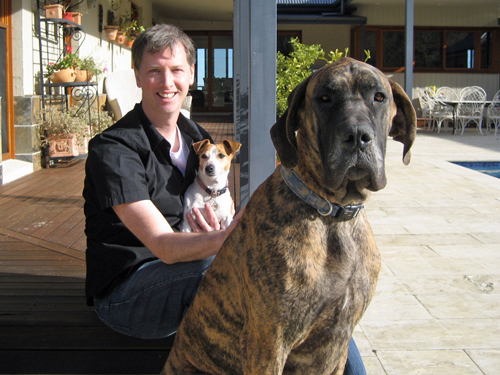
Call it the “Terry Fox effect.”
New OVC professor Tony Mutsaers was a child when Terry Fox ran through the small town outside London where Mutsaers was living, but he’s never forgotten it. Seeing Fox – who had lost a leg to cancer and died before completing his fundraising run across Canada – sparked Mutsaers’s interest in trying to find ways to defeat cancer.
That’s still his goal today. “I focus on bone cancers, which is what Terry Fox had,” he points out. “My PhD research was funded by the Terry Fox Foundation. He really did inspire me.”
However, Mutsaers muses that he might have taken “the longest road possible” to get to his new position in OVC, where he will mix both clinical and research work to combat cancer in dogs – research that will have implications for people with cancer as well.
As he explains: “Testing medications for people requires involving thousands of patients and large amounts of money. The challenge is to make sure the drugs used in those studies are the ones with the most potential to be helpful.” Research using animals helps to do that. In the past, many drugs have been tested on rodents but Mutsaers finds that these studies are not necessarily predictive of how the treatments will work with people.
“These bone cancers occur naturally in dogs,” he says, “so it makes sense to do the research while we treat them. OVC has the experience to run ethical trials with animals, and we are part of a consortium to do larger trials with other veterinary schools. Our goal is to help the animals with these cancers and also provide knowledge that can help people.”
Mutsaers’s “long road” to OVC began at the University of Waterloo, where he studied biochemistry and had a research job at Labatt’s. “That was a fantastic job,” he says. “Lots of free beer!” He transferred to the University of Guelph after three semesters, and found another summer research position at Agriculture Canada in a plant research lab, studying a potato virus that had closed the border for exports of Canadian potatoes.
That research experience and an understanding of regulatory and public health issues helped him gain admission to OVC, he believes, and his interest in research continued. “Most of my classmates were working in small animal clinics, but my summer jobs were all research projects,” he says. “I then went to Cornell University’s Leadership program, where veterinary medicine students learn more about research as a career. That’s when I first began studying cancer in animals.”
After graduation, Mutsaers worked in a general practice clinic in Newcastle, Ont. “I tell students that I think it is very valuable to go into general practice even if you are planning to go into a clinical specialty or research. It always helps to be able to remember back to the issues and problems that face the general practitioner. When I need to talk to a vet from a small town mixed practice, I can relate because I’ve been there.”
After a year, he returned to OVC to complete an internship, and then went to Purdue University to do a three-year oncology residency and became board-certified in medical oncology.
With those qualifications in hand, Mutsaers traveled to Australia to be a consultant for the Animal Cancer Care service at the University of Queensland. He almost didn’t go: “When the offer came in, I’d already been accepted to work on a PhD at the University of Toronto,” he says. But he persuaded the U of T lab to wait a year so that he could take up the Australian position.
While his experiences there were positive, Mutsaers was happy to return to Canada a year later and began his studies at U of T, again studying cancer. “None of my thesis work there had anything to do with being a vet,” he says. “But the value of having really strong training in research is that you can apply it anywhere.” His PhD is in medical biophysics, and he studied a new family of more specific cancer drugs and improving treatments. He maintained his veterinary connections by consulting with the clinic at OVC one day a week.
For his post-doc, he returned to Australia, where he conducted research on several types of cancers, including bone and bone marrow/leukemia. This gave him a solid background in cancer research that made him a perfect candidate when the position at OVC opened up. “My area of interest is something the University is making a strong focus,” he says. “I already know many of the people here and their work.”
For the equivalent of about one day per week, Mutsaers will provide consultation services for cancer cases that are referred to the small animal clinic. The rest of the time he will be investigating various aspects of cancer growth and treatment, including the biology behind tumour metastasis, and discovering new ways to use traditional chemotherapy drugs to provide better, more effective treatments for the animals.
“My goal is to see how we can best apply new therapies and combine these novel treatments with conventional therapies for the best outcomes for dogs with cancer,” he says.